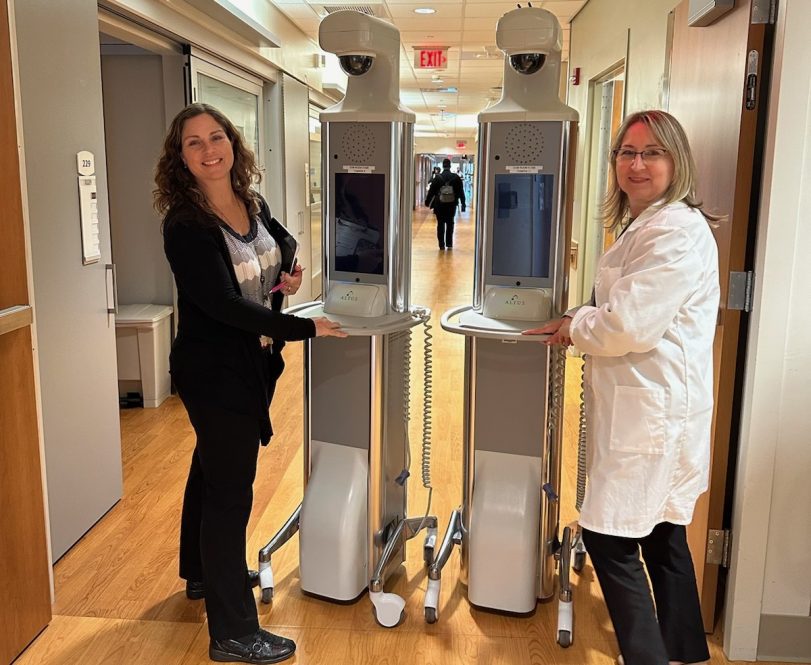New Telesitter technology launches offering Remote Sitter capabilities for some inpatients via electronic video monitoring carts.
UConn John Dempsey Hospital is now home to high-tech Telesitters.
The new, mobile Electronic Video Monitoring Camera Cart technology can easily be rolled-into any hospital patient room and remotely monitor a patient for elevated patient safety.
Thanks to the enhanced technology some patients at UConn John Dempsey Hospital will have Telesitter technology deployed to their room so trained Remote Sitter hospital staff can monitor the patient’s activity more closely for safety and care needs through the video monitoring system.
Impressively, the Telesitting solution allows for a single staff person to monitor multiple patients at a time in a single, central-monitoring setting. In fact, hospital staff can now monitor up to eight patients at a time, providing an efficient way to both visualize and communicate through the Electronic Video Monitoring Camera. The Telesitter technology allows the Remote Sitter hospital staff to also respond directly to the patient via the cart and trigger any necessary staff response or alarms.
The project’s launch so far includes the deployment of 15 Electronic Video Monitoring Camera Carts.
Information Technology’s Jason Cardona as Project Manager and Darcie Schwab as EPIC Analyst at UConn Health were both instrumental in operationalizing the Telesitting initiative program.
“Darcie and I are very proud of the work the team has done,” says Cardona. “Our early November go-live was a success, and I am happy to share that on day-one we were able to avoid two potential falls of patients that were getting out of the bed identified by the EVM techs who promptly triggered the stat alarm. Within seconds, a nurse rushed into the room and redirected the patient to prevent a negative outcome. It was great to see the impact this technology solution has on patient safety and the added value it brings to patient care.”
“Telesitting technology is a major advancement bringing more support to our hospital staff which is a big win. This IT solution will enable UConn John Dempsey Hospital to redeploy staff for other operational needs and leverage centralized monitoring in a more modern and cost-effective way too,” applauds Chief Information Officer Rick McCarthy of UConn Health.
A thorough nursing assessment will determine the need for this new technology and in collaboration with the Nursing Supervisor, the camera cart will be deployed to improve individualized patient safety needs. Highly trained monitor techs now have the ability to document monitoring status, along with any interventions needed to keep the patient safe, directly into the patient’s electronic health record in EPIC for their medical care team’s view.
Anna Humennyj, RN, associate director of Nursing Operations at UConn John Dempsey Hospital is the operational leader for this new Telesitter technology, which was deployed on most inpatient hospital units.
Humennyj says, “This is an exciting opportunity to improve the quality of our patient’s wellbeing. Patient safety is our highest priority, and we can now monitor our patients in real-time and provide real-time interventions and feedback to the care team.”
Additionally, the educational team of Amanda Darcey, MSN, RN, CWCN and Melinda Kindulas, MSN, RN, have also been instrumental in developing workflows, policy, and educational plans for the initiative. Along with EPIC principal trainer Daniel Ozimek, they have provided extensive education and training for the successful November 5 go-live.
UConn Health CEO Dr. Andrew Agwunobi concludes, “Telesitting is a very exciting, efficient, and innovative new patient monitoring tool that we have begun leveraging to take our patient safety to the next level, which is always our top priority.”

